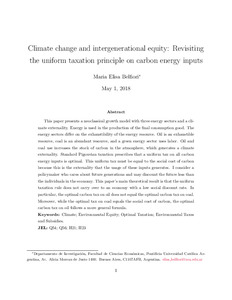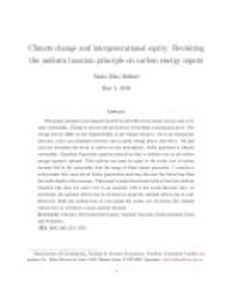Por favor, use este identificador para citar o enlazar este ítem:
https://repositorio.uca.edu.ar/handle/123456789/9490| Campo DC | Valor | Lengua/Idioma |
|---|---|---|
| dc.contributor.author | Belfiori, María Elisa | es |
| dc.date.accessioned | 2020-02-28T17:57:07Z | - |
| dc.date.available | 2020-02-28T17:57:07Z | - |
| dc.date.issued | 2018 | - |
| dc.identifier.citation | Belfiori, M.E. Climate change and intergenerational equity : revisiting the uniform taxation principle on carbon energy inputs [en línea]. Energy Policy. 2018, 121. doi:10.1016/j.enpol.2018.06.026 Disponible en: https://repositorio.uca.edu.ar/handle/123456789/9490 | es |
| dc.identifier.issn | 0301-4215 | - |
| dc.identifier.uri | https://repositorio.uca.edu.ar/handle/123456789/9490 | - |
| dc.description.abstract | Abstract: This paper presents a neoclassical growth model with three energy sectors and a climate externality. Energy is used in the production of the final consumption good. The energy sectors differ on the exhaustibility of the energy resource. Oil is an exhaustible resource, coal is an abundant resource, and a green energy sector uses labor. Oil and coal use increases the stock of carbon in the atmosphere, which generates a climate externality. Standard Pigouvian taxation prescribes that a uniform tax on all carbon energy inputs is optimal. This uniform tax must be equal to the social cost of carbon because this is the externality that the usage of these inputs generates. I consider a policymaker who cares about future generations and may discount the future less than the individuals in the economy. This paper's main theoretical result is that the uniform taxation rule does not carry over to an economy with a low social discount rate. In particular, the optimal carbon tax on oil does not equal the optimal carbon tax on coal. Moreover, while the optimal tax on coal equals the social cost of carbon, the optimal carbon tax on oil follows a more general formula. | es |
| dc.format | application/pdf | es |
| dc.language.iso | eng | es |
| dc.publisher | Elsevier | es |
| dc.rights | Acceso abierto | * |
| dc.rights.uri | http://creativecommons.org/licenses/by-nc-sa/4.0/ | * |
| dc.source | Energy Policy. 2018, 121 | es |
| dc.subject | CAMBIO CLIMATICO | es |
| dc.subject | CLIMA | es |
| dc.subject | DESARROLLO ECONOMICO | es |
| dc.subject | MEDIO AMBIENTE | es |
| dc.subject | IMPUESTOS | es |
| dc.subject | TRIBUTACION | es |
| dc.subject | EXTERNALIDADES | es |
| dc.subject | ENERGIA | es |
| dc.subject | CARBON | es |
| dc.title | Climate change and intergenerational equity : revisiting the uniform taxation principle on carbon energy inputs | es |
| dc.type | Artículo | es |
| dc.identifier.doi | 10.1016/j.enpol.2018.06.026 | - |
| uca.disciplina | ECONOMIA | es |
| uca.issnrd | 1 | es |
| uca.affiliation | Fil: Belfiori, María Elisa. Pontificia Universidad Católica Argentina. Facultad de Ciencias Económicas. Departamento de Investigación Francisco Valsecchi; Argentina | es |
| uca.version | acceptedVersion | es |
| item.fulltext | With Fulltext | - |
| item.languageiso639-1 | en | - |
| item.grantfulltext | open | - |
| crisitem.author.dept | Facultad de Ciencias Económicas | - |
| crisitem.author.dept | Departamento de Investigación | - |
| crisitem.author.dept | Centro de Investigaciones en Economía (CIE) [Finalización de actividades: 31/12/2021] | - |
| crisitem.author.parentorg | Pontificia Universidad Católica Argentina | - |
| crisitem.author.parentorg | Facultad de Ciencias Económicas | - |
| crisitem.author.parentorg | Departamento de Investigación | - |
| Aparece en las colecciones: | Artículos | |
Ficheros en este ítem:
| Fichero | Descripción | Tamaño | Formato | |
|---|---|---|---|---|
| climate-change-intergenerational-equity.pdf | 274,22 kB | Adobe PDF |  Visualizar/Abrir | |
| climate-change-intergenerational-equity.jpg | 3,43 kB | JPEG |  Visualizar/Abrir |
Visualizaciones de página(s)
393
comprobado en 06-feb-2026
Descarga(s)
437
comprobado en 06-feb-2026
Google ScholarTM
Ver en Google Scholar
Altmetric
Altmetric
Este ítem está sujeto a una Licencia Creative Commons

